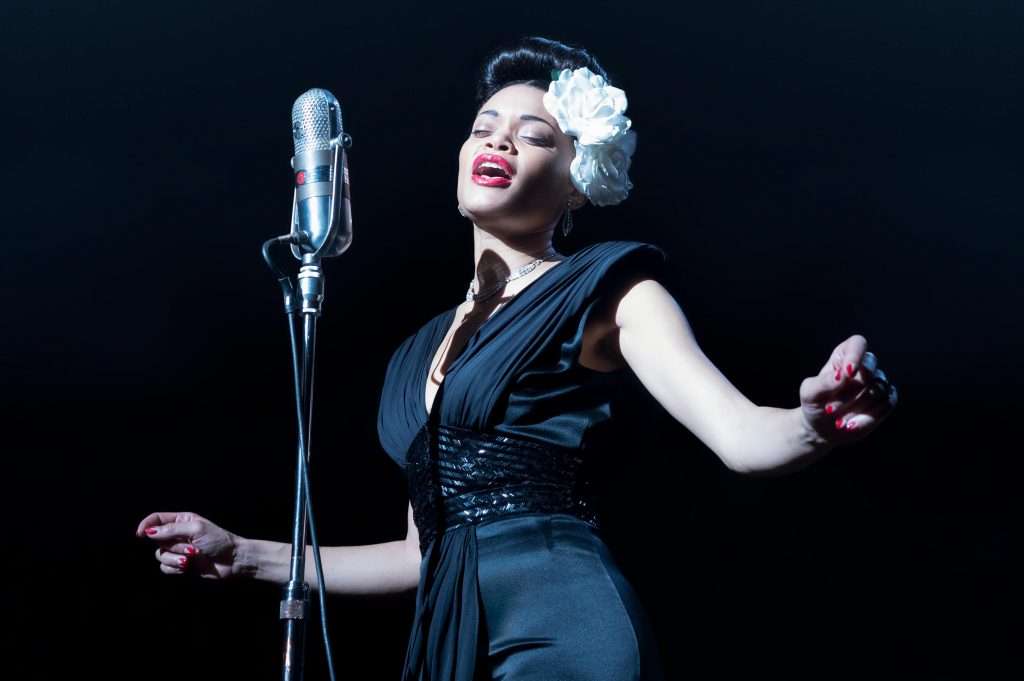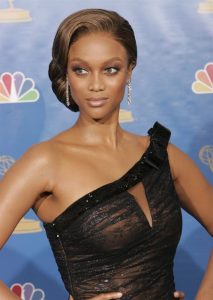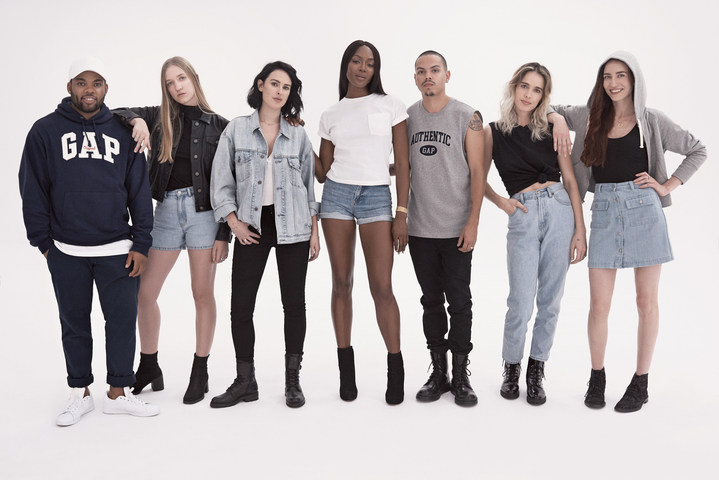March 24, 2023
by Carla Hay

Directed by Kim Bass
Some language in Spanish with subtitles
Culture Representation: Taking place in Oakland, California, the comedy/drama film “A Snowy Day in Oakland” features a predominantly African American cast of characters (with some white people and Latinos) representing the working-class, middle-class and wealthy.
Culture Clash: After a bitter breakup from her boyfriend/business partner, an affluent psychologist moves her office from an upscale part of San Francisco to a working-class community in Oakland, where she and her services get curiosity and skepticism from people in the community.
Culture Audience: “A Snowy Day in Oakland” will appeal primarily to people who are fans of the movie’s headliners and movies with formulaic but well-meaning scenarios about relationship problems and social-class prejudices.

“A Snowy Day in Oakland” looks like a made-for-TV movie instead of a movie worth seeing in cinemas. The predictable schmaltz of this fairy tale is elevated by the talent of the charismatic cast members. There are enough good qualities to make it watchable.
Written and directed by Kim Bass, “A Snowy Day in Oakland” is a little too overstuffed with characters who are mostly underdeveloped. However, some of the better-developed characters stand out enough to carry the movie and keep it interesting to viewers who have tolerance for this type of lightweight entertainment. The movie’s jokes are hit and miss, but the comedy that works the best in “A Snowy Day in Oakland” has to do with authentic observations about relationships and people’s various perceptions of psychotherapy.
“A Snowy Day in Oakland” begins with a well-dressed and attractive woman turning heads and immediately causing gossip when she walks down a business street in a working-class community in Oakland, California. She’s looking at a vacant office space that is available. Three of the businesses on this street are a barber shop/beauty salon, a bodega and an Afro-centric clothing store. Because of her designer clothes and because she is driving a well-kept Mercedes, the people on this street can immediately tell that she doesn’t live in this community.
This stranger who has come to Oakland is LaTrice Monroe (played by Nicole Ari Parker), a psychologist/therapist who had her office based in a ritzy part of San Francisco, but she is now moving her office to this lower-income part of Oakland. Flashbacks show that LaTrice is making this move because she had a bad breakup with her British boyfriend/business partner Grant (played by Sean Maguire), a psychologist/therapist who shared office space with her. LaTrice caught Grant cheating on her in the office with one of his female clients.
LaTrice spent some of her childhood in this Oakland neighborhood but moved away to Connecticut when she was about 9 or 10 years old, because her father got an executive job at an unnamed company. (In these childhood flashbacks, Jasmyn Renee Coleman plays a young Latrice; Candis Woods plays LaTrice’s mother; and Joshua Shipman plays LaTrice’s father.) LaTrice now wants to go back to her Oakland roots. But will she be welcome in this community?
LaTrice’s father became such a successful businessperson, she spent most of her life living with wealth. How rich is LaTrice’s father? When he finds out that LaTrice is moving her office, he offers to helicopter some cash over to her to help her get a new start with her business. LaTrice politely declines the offer. (Keith David and Jackée Harry have quick cameos as LaTrice’s present-day parents.)
Inside the barber shop/beauty salon, the two owners—a divorced couple named Davis Witherspoon and Theona Witherspon—have very different reactions to seeing LaTrice through the window. Davis (played by Deon Cole) looks at Latrice with lust, while Theona (played by Kimberly Elise) looks at LaTrice with suspicion. Theona comments that LaTrice looks like she might come from the wealthy San Francisco neighborhood Nob Hill, which has the unflattering nickname Snob Hill. LaTrice has “Snob Hill written all over her,” Theona says with a scowl, while also mentioning that LaTrice looks “too expensive” to be a customer at this salon.
Theona also scolds Davis for leering at LaTrice. Davis insists that he was just admiring LaTrice’s car, but he’s not fooling anyone. It’s later revealed that Theona and Davis were married for 11 years and have been divorced for 15 years. Theona dumped Davis because he cheated on her multiple times. And she’s still very bitter and heartbroken about the divorce, but she tries to hide it by acting tough with Davis. Meanwhile, Davis is hiding his own hurt too, because he didn’t really want to get divorced.
Oakland is in a part of California where it doesn’t snow. The title of “A Snowy Day in Oakland” comes from a catch phrase repeated multiple times in the movie: “It’ll be a snowy day in the middle of an Oakland summer before that ever happens.” Theona says it near the beginning of the movie when she makes a comment that “it’ll be a snowy day in Oakland” before she would ever think about marrying Davis again.
The owner of the Afro-centric clothing store, which is called Nubian Queen, is a young entrepreneur named Rodney Mali (played by Evan Ross), who designed all the clothes in the store. Rodney is the first business owner to greet LaTrice when she moves her office into the vacant space next to his store. Rodney is friendly, but he’s got some problems. His store is financially struggling, because he hasn’t been getting the sales he was expecting, and he’s behind on his rent.
Viewers later find out that LaTrice paid for a one-year lease in advance, which makes her arrogant and greedy landlord Marquis King (played by Reno Wilson) very happy. Marquis likes to announce and remind his tenants (and anyone else who’ll listen) that he owns all the buildings on this street. Marquis is very close to evicting Rodney, unless Rodney can come up with the money that he owes Marquis in a short period of time.
The bodega, which is called Barrio USA, is owned by Jesus Salgado (played by Tony Plana), a Cuban immigrant with some health problems. Jesus operates the store with his young adult daughter Angelica (played by Claudia Zevallos), who is expected to take over the business after Jesus is no longer able to work. Jesus and Angelica are curious about LaTrice, but they initially keep their distance from her.
Another regular on this street is Jeanette Ellis (played by Loretta Devine), a mail deliverer for the U.S. Postal Service. Jeannette is talkative, outspoken and very gossipy. She likes to brag about her son, who is a special agent for the FBI. Jeanette is supposed to be the funniest character in the movie, but her constant loud-mouthed antics can easily get irritating.
Someone else who is frequently on this street is an aspiring rapper in his late teens named Dwayne (played by Donis Leonard Jr.), whose rapper name is Glock 9. Dwayne/Glock 9 sells his CDs to people in the neighborhood. When he goes into the barber shop/beauty salon to sell his CDs, Theona graciously buys a CD, but Davis is rude and dismissive to Dwayne.
A nearby church has an upstanding reverand named Darius Carter (played by Michael Jai White), who used to be a professional football player, but his football career ended a lot sooner than he wanted, for reasons revealed in the movie. The organist at the church is Mrs. Keys (played by Marla Gibbs), who is like a sassy mother figure to many people in the church. LaTrice attends a service at the church for the first time, and she continues to turn heads and cause gossip.
When the word gets out that LaTrice is a psychologist who is opening an office on the street for therapy counseling, most people are skeptical that the business will succeed in this community. “Black people don’t talk about their real problems!” Jeanette declares. Dwayne/Glock 9 tells LaTrice that people in the community won’t trust her, because she comes from a wealthy family and doesn’t have any “street cred.”
LaTrice’s ex-boyfriend Grant shows up at her new office and begs her to get back together with him. He also thinks it’s a bad idea for her to set up her office in this community. Grant says to Latrice: “You want to throw away everything we had to play witch doctor to these people?” Latrice replies, “These people are my people.” And then, Latrice chases Grant out of her office.
It isn’t long before some of the community skeptics let down their guard and end up getting counseling from LaTrice. It’s implied that LaTrice is offering her services at a much lower rate than what she charged when she worked in San Francisco. And so, LaTrice starts to hear about all of these new clients’ problems and offers them some advice. But will they take that advice?
A flaw with “A Snowy Day in Oakland” is that it tries to do too much with some of the supporting characters in its 92-minute running time, but a lot of these subplots just end up being flimsy and not very substantial to the story. There’s a subplot about Darius having to decide whether he will stay a pastor at the church or take a job offer to coach football at Florida State University. Another subplot is about Jesus disapproving of his daughter Angelica flirting with a young white cop named Officer Daniels (played by Jay Jablonski), who is a frequent customer in the bodega.
The movie also occasionally fumbles jokes about race relations. In a not-very-funny sequence, a ditzy and rich client of LaTrice’s named Shelby (played by Arden Myrin), who is white, suddenly becomes fascinated with the Afro-centric clothing in Rodney’s store. It’s supposed to be amusing that Shelby (who has some of the worst lines in the movie) goes from looking like a Barbie doll to looking like Erykah Badu, as Theona sarcastically remarks when she sees Shelby in clothes bought from Rodney’s store. However, this “cultural appropriation” gag is mishandled and becomes very stale when it’s repeated awkwardly.
“A Snowy Day in Oakland” starts an interesting subplot and then leaves it dangling, because it’s introduced so late in the story. It’s about Rodney not feeling accepted by his father, who is never seen or heard from in the movie. It’s implied that Rodney is estranged from his father and might not be in contact with him anymore.
According to Rodney, his father thinks it’s too effeminate for a man to pursue a career in fashion design. And when Rodney was a child, his father expected Rodney to play sports, but Rodney was more interested in his mother’s clothes. Dwayne/Glock 9 asks Rodney if Rodney is gay, but Rodney doesn’t answer the question, because Rodney’s sexuality is irrelevant to how his work should be judged.
However, this subplot about Rodney’s troubled relationship with his father just brings up questions that the movie never bothers to answer. What kinds of sacrifices did Rodney make to pursue his fashion dreams? Is he interested in reconciling with his father? And what about Rodney’s mother, who is never seen or heard from in the movie? These unanswered questions just make Rodney’s character look underdeveloped.
“A Snowy Day in Oakland” is at its most interesting when showing what happens in the volatile relationship between ex-spouses Theona and Davis. Elise gives the best performance in the movie, as someone with a lot of emotional baggage that she finds very difficult to unpack. Some of the characters in “A Snowy Day in Oakland” are shallow caricatures, but Theona is the movie’s most realistic character.
“A Snowy Day in Oakland” is truly a mixed bag. Some moments are very corny, such as when LaTrice envisions herself on her therapist’s couch and talks to herself like a therapist. There’s also some very heavy-handed melodrama involving Dwayne/Glock 9 in the last third of the movie. And the movie has a rushed scenario that wraps up Marquis’ storyline in a very phony-looking way.
Other moments in “A Snowy Day in Oakland” are heartfelt in the drama, or genuinely funny in the comedy, thanks largely to cast members such as Elise, Parker, Devine, Cole and Gibbs, who are all very skilled at having the right timing in their dialogue. To its credit, “A Snowy Day in Oakland” is not pretending to be a masterpiece. It’s the type of movie that can be mildly enjoyable, if a viewer wants to watch harmless entertainment that doesn’t take itself too seriously.
People of Culture Studios released “A Snowy Day in Oakland” in select U.S. cinemas on March 17, 2023.







